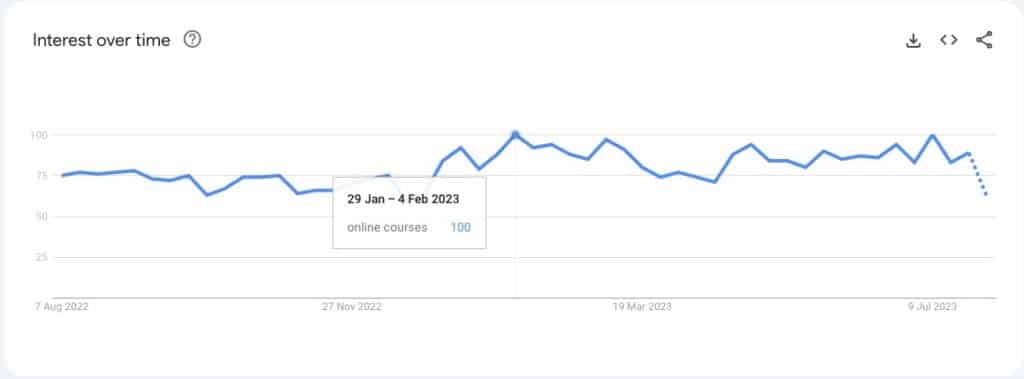For digital marketers, staying ahead of the curve is crucial, especially in the Australian Education sector. One of the most effective ways to do this is by leveraging SEO tools, understanding the trends, and applying the concept of Entity SEO. In this post, we’ll explore how to use Google Trends for SEO, focusing on the trending keyword “Google SEO course”, and share some critical insights about web traffic in the Australian Education industry.
Understanding Google Trends for SEO
Google Trends is a powerful tool that allows you to understand the popularity of search terms over time. It can help you identify trending topics, seasonal fluctuations, and geographical differences in search interest. This information can be invaluable when planning your SEO strategy.
For instance, by analysing Google Trends data, you might discover that interest in online courses spikes in January and February. You could use this insight to align your content and marketing efforts with these peaks, maximising your visibility and traffic. (Source: Google Trends)

The Power of the Keyword: “Google SEO Course”
One of the trending keywords in the education sector is “Google SEO course”. This keyword is particularly valuable as it indicates a strong interest in learning about SEO, specifically through Google’s resources.
But how does this relate to the broader web traffic trends in the education sector? Let’s dive into some data. (Source: Similarweb Science and Education Industry June 2022 – July 2023)

Web Traffic Insights in the Education Industry
Our data shows that most web traffic in the education sector comes from direct sources (60.17%), followed by Google Search (23.85%). However, there has been a decrease in traffic from these sources over time, with direct sources seeing a decline of 24.09% and Google Search witnessing a reduction of 20.80%.
This data suggests that while direct sources are a significant traffic driver, a substantial portion of the traffic comes from Google Search. This underscores the importance of SEO in driving visibility and traffic.
In this context, the interest in “Google SEO course” is even more significant. It suggests that there’s a large audience actively seeking to understand and leverage SEO, and they’re turning to Google to do so. (Source: Similarweb Science and Education Industry June 2022 – July 2023)

Understanding Entity SEO
In the realm of SEO, we often focus on keywords, but there’s another equally important concept: Entity SEO. As defined by Google, an entity is a “thing or concept that is singular, unique, well-defined, and distinguishable.” It doesn’t need to be a physical object; it can be a colour, a date, an idea, and more.
Entities are the building blocks of content. They are connected by relationships, forming the basis of the information we provide to our audience. For example, in the statement, “SEO is vital for education,” there are two entities: “SEO” and “education.” The relationship is the connection between these two entities.
Incorporating Entity SEO into Your Education Marketing Strategy
To optimise in this new world of Entity SEO, we need to change the way we think about our sites and how we market externally. If we want to rank for “online courses,” we need to consider that Google can now understand all the various entities related to them and in which order the searcher’s intent will most likely be met.
We need to consider which entities we need on our site and how they need to be connected to maximise the probability of Google understanding that we are more likely to meet the variety of possible intents than our competitors.
For instance, if your website offers an “online SEO course,” you must ensure that all the entities related to this course – the course content, the instructor, the course duration, the course price, and so on – are well-defined and interconnected on your site. This will help Google understand the relationships between these entities and increase the likelihood of your site ranking higher in search results.
Entity SEO in Practice: The ‘Google SEO Course’ Example
Let’s take the example of the trending keyword “Google SEO course”. This keyword is an entity in itself, and it’s related to several other entities such as “Google”, “SEO”, and “course”.
When creating content around this keyword, you should aim to define and establish relationships between these entities. For example, you could create a comprehensive guide on Google SEO courses that covers what these courses are, why they’re important, who they’re for, what they cover, and how they can benefit the reader.
By doing this, you’re not just using the keyword “Google SEO course” in your content. However, you’re also defining the entities related to it and their relationships. This can help Google understand your content better and increase its chances of ranking higher in search results.
Conclusion
SEO is a powerful tool for digital marketers in the education sector. By leveraging tools like Google Trends and creating high-quality, relevant content, you can drive traffic to your site, increase your visibility, and ultimately achieve your marketing goals.
